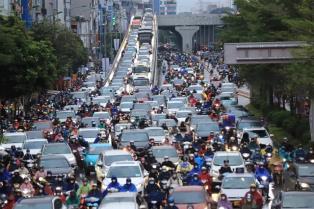About 45,000 completely-built-up (CBU) automobiles, worth US$1.2 billion, were imported into Viet Nam in the first five months of the year, the industry and trade ministry said.
 |
| In May alone, 10,000 automobiles, worth $337 million, were imported, posting an increase of $43 million in terms of value. This is the highest import turnover achieved since the beginning of 2014. — Photo vneconomy |
HA NOI (Biz Hub) — About 45,000 completely-built-up (CBU) automobiles, worth US$1.2 billion, were imported into Viet Nam in the first five months of the year, the industry and trade ministry said.
The volume and value of the imports were almost 80 per cent of the total for 2014 as a whole, at 72,000 units and $1.57 billion, representing an increase of 62.8 per cent and 60.1 per cent, respectively, compared to the same period last year.
In May alone, 10,000 automobiles, worth $337 million, were imported, posting an increase of $43 million in terms of value. This is the highest import turnover achieved since the beginning of 2014.
The import of automobiles in recent months has shown a slight increase in volume and a significant rise in value month-on-month. This is due to the increasing imports of trucks and specialised vehicles, primarily from China.
The rapid and continuous surge of imported automobiles has put pressure on the domestic production and assembly sector.
One of the reasons why customers prefer imported trucks from China is that they are cheaper than those from other countries and even the locally assembled trucks.
The ASEAN-China Trade in Goods Agreement in the 2015-18 period, which took effect at the beginning of the year, has applied preferential taxes on imported CBUs.
Specifically, the import tax on CBU trucks of more than 45 tonnes is zero, while on trucks of 25 to 45 tonnes, it is 10 to 15 per cent.
A calculation of the Viet Nam Association of Mechanical Industry (VAMI) said a locally assembled truck (including assembling costs and import tax on spare parts) in Viet Nam costs 24 per cent higher than an imported one.
In addition, the country has no Made-in-Viet-Nam automobile.
Chairman of Vinaxuki Bui Ngoc Huyen told Thoi Bao Kinh Doanh that lack of capital and the effects of tax policies were also factors.
Former Director of the Institute for Trade Research Nguyen Van Nam said the purchase of automobiles has been increasing in recent years, despite the economic downturn.
However, Vietnamese people prefer imported automobiles over local products.
Many experts urged the quick completion of the development master plan for the country's automobile industry.
General Director of Ford Viet Nam Jesus Metelo Arias said with the current growth rate, the country's automobile market was expected to reach sales of 200,000 units this year. Among these, imported CBUs will account for half of the total. — VNS





